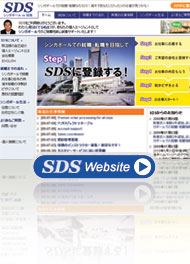Singapore's Quick Economic Recovery Sparks
 The Return Of Japanese Expatriates (18/06/2010 The Straits Times) The Return Of Japanese Expatriates (18/06/2010 The Straits Times)
The Japan Association of Singapore had recorded its highest membership count of 4,431 ordinary members in March this year - the highest record since 1980, compared to 4,078 in 2007. Although these figures exclude corporate or family members, Secretary-General of The Japanese Association of Singapore's (JAS) since 1987 - Mr Kazuo Sugino, estimated that currently, around 12,000 Japanese have ties with the association here. They make up about half the total number of Japanese living and working in Singapore.
The growing number of Japanese expatriates in Singapore marks a different trend from a year ago, when the JAS saw many of its members returning to Japan. This was due to Singapore being affected by the global economic downturn last year, and a large number of expatriate professionals in Singapore were made to pack up and return to their homelands by their companies whose business suffered significant declines. Many of such expatriates, including those from Japan, left Singapore - taking their families along with them. However, Singapore's economy improved quickly, and business had picked up extensively this year. Even more so, growth had been forecasted to be promising, and this had led to increased opportunities for foreign investments again - Setting up businesses and regional headquarters here have encouraged the return of expatriates to Singapore. Mr Sugino noted the increased number of his fellow-countrymen moving to Singapore for work in the past few months, and that this had led to the increase in membership numbers at JAS. He further explained of Japanese companies' constant interest in expanding business operations in Singapore, he said "The Singapore Government has created many incentives, such as lower corporate taxes, which has encouraged Japanese investors and companies to set up regional headquarters here". (Also see Vol.3 (Issued 01 Dec. 2009) )
Secretary-General of the Japanese Chamber of Commerce and Industry in Singapore - Mr Junichi Azuma, informed that several Japanese companies such as logistics service providers Yamato Asia and Nippon Express have set up regional offices here recently. He added that Electronics company - Panasonic, opened a research and development center here last month.
Japanese IT company NEC Asia Pacific Director of Regional Human Resource - Mr Ichiro Nakajima, 40, noted that his company recently posted more Japanese staff to work in Singapore. He explained that there were more work opportunities for Japanese expatriates in Singapore now than it did two years ago. "We expect a high economic growth rate in this region. Having a presence here in Singapore will help foreign companies expand their foothold in this region," he said.
With more Japanese making Singapore their home again, retail and other businesses that cater to the market will also be expanding. Liang Court - a shopping mall popular with Japanese - will be introducing a new a Japanese-themed food court next month, managed by Kopitiam. General Manager of AsiaMalls Management (which runs Liang Court) - Ms Stephanie Ho, reported that the number of Japanese shoppers participating in their promotions has grown. On average, up to 600,000 shoppers visit the mall each month. One of Liang Courts existing mall tenant - Greenberry Loft, which sells babies' and children's apparel from Japan, has expanded its business by doubling its shop space to 500 sq ft late last month. Ms Miho Terawaki, the shop's owner, said she decided to expand because she had increased her inventory hoping to attract more Japanese customers. Her decision seems to have paid off. "Since I relaunched the shop, I've seen more Japanese customers." she said.
Japanese culture has always been very widely appreciated in Singapore. From fashion to food, cosmetics to even medicine, the business opportunities for Japanese products in Singapore are unlimited. With the abundance of Japanese selection of products available in Singapore, coupled with Singapore's cost of living being lesser than most major Japanese cities (see Most Expensive Cities In ASIA 2010 listing below), life for Japanese expatriates in Singapore is indeed attractive.
Most expensive cities in Asia 2010
(From http://www.todayonline.com/ )
1. Tokyo (1)
2. Nagoya (4)
3. Yokohama (5)
4. Kobe (7)
5. Seoul (20)
6. Hong Kong (34)
7. Shanghai (46)
8. Beijing (55)
9. Singapore (67)
10. Busan (75)
(Number in brackets = World ranking)
|

 The Return Of Japanese Expatriates (18/06/2010 The Straits Times)
The Return Of Japanese Expatriates (18/06/2010 The Straits Times)
 Japan lost to the Netherlands by the score of 0-1 in our latest World Cup game played. Considering we only lost by a solitary goal, we should give our team credit. Although in my opinion, we should take on a more attacking approach to our game, but our National team may be strategising differently in order to get the needed results from each game.
Japan lost to the Netherlands by the score of 0-1 in our latest World Cup game played. Considering we only lost by a solitary goal, we should give our team credit. Although in my opinion, we should take on a more attacking approach to our game, but our National team may be strategising differently in order to get the needed results from each game.